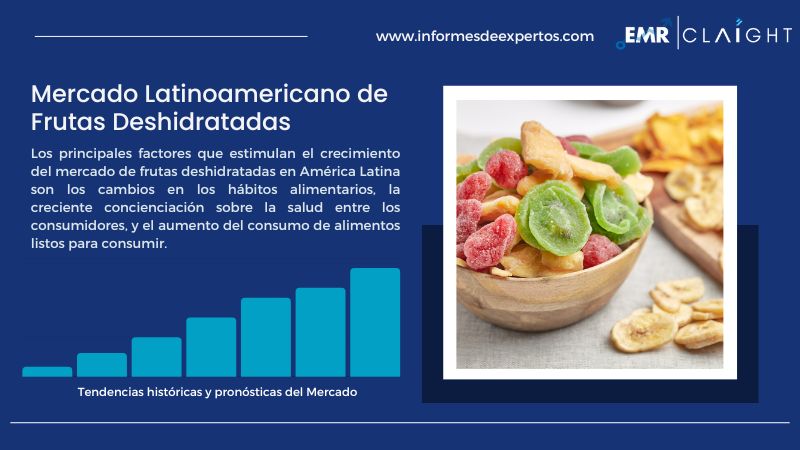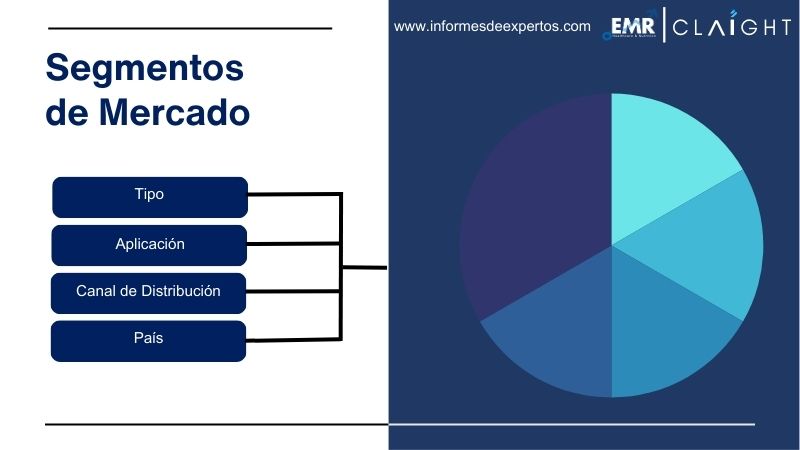Informes

Mercado Latinoamericano de Frutas Deshidratadas – Por Tipo (Albaricoques, Dátiles, Pasas, Higos, Bayas, Otros); Por Aplicación (Confiterías, Productos Lácteos, Productos de Panadería, Snacks y Barritas, Postres, Cereales, Otros); Por Canal de Distribución (Online, Offline); Por País (Brasil, México, Argentina, Otros); Dinámica del Mercado y Panorama Competitivo
Perspectiva del Mercado Latinoamericano de Frutas Deshidratadas
El mercado latinoamericano de frutas deshidratadas alcanzó un valor de USD 4,555.35 millones en el año 2025. Se estima que el mercado crecerá a una tasa de crecimiento anual compuesta del 4,8% entre 2026 y 2035, para alcanzar un valor de 6,928.74 millones de USD en 2035.
Tamaño del Mercado y Pronóstico:
- Tamaño del Mercado en 2025: USD 4.555,35 millones
- Tamaño del Mercado Proyectado en 2035: USD 6.928,74 millones
- CAGR (2026–2035): 4,8%
Las frutas deshidratadas son frutas de las que se ha eliminado el contenido de agua mediante secado al sol o mediante el uso de secadores o deshidratadores especializados. Son una buena fuente de nutrición y los consumidores conscientes de la salud las consumen ampliamente como refrigerio. Contienen altas cantidades de minerales, vitaminas, antioxidantes y fibra y ofrecen varios beneficios para la salud, como aumentar la inmunidad, mantener un corazón y huesos saludables, ayudar a perder peso y prevenir enfermedades relacionadas con el estilo de vida. Las frutas deshidratadas encuentran aplicaciones importantes en repostería, cereales, productos de panadería, productos lácteos, postres, snack bars, etc.

Informe de muestra gratuito con índice: Obtenga un informe de muestra gratuito con tabla de contenido
La demanda de frutas deshidratadas en América Latina está impulsada por el creciente número de personas conscientes por la salud, junto con las crecientes preferencias de los consumidores por alimentos saludables y nutritivos. La popularidad en aumento de los cereales para el desayuno y la merienda como la avena, el muesli, los copos de maíz, etc., que contienen frutas deshidratadas para aumentar su valor nutricional, impulsa aún más el mercado. Además, el aumento de la población de clase media, el aumento de los ingresos disponibles y la demanda de snacks elaborados con ingredientes naturales también promueven el crecimiento.
El aumento de problemas de salud como la obesidad, la diabetes, la hipertensión arterial, etc., y la creciente población geriátrica están estimulando el consumo de dátiles, albaricoques, pasas, etc. Además, las características del producto, como ser menos perecedero y fácil de transportar, lo convierten en una opción popular para bocadillos saludables. Por lo tanto, la tendencia emergente de los productos on-the-go está teniendo un impacto positivo en la industria. Hoy en día, la demanda de chocolates que contienen frutas deshidratadas está aumentando enormemente, especialmente entre los adolescentes, lo que ayuda aún más al crecimiento de la industria.

Informe de muestra gratuito con índice: Obtenga un informe de muestra gratuito con tabla de contenido
Las Frutas Deshidratadas: Segmentación del Mercado
Por tipos, el mercado se divide en:
- Albaricoques
- Dátiles
- Pasas
- Higos
- Bayas
- Otros
En función de la aplicación, el mercado se clasifica en:
- Confiterías
- Productos Lácteos
- Productos de Panadería
- Snacks y Barritas
- Postres
- Cereales
- Otros
Según el canal de distribución, el mercado se segrega en:
- Online
- Offline
En función del país, el mercado se segmenta:
- México
- Brasil
- Argentina
- Otros

Informe de muestra gratuito con índice: Obtenga un informe de muestra gratuito con tabla de contenido
La creciente conciencia sanitaria y la demanda de aperitivos naturales y saludables impulsarán el mercado latinoamericano de frutas deshidratadas
El mercado está experimentando un crecimiento debido al aumento de personas preocupadas por su salud, los cambios en los hábitos alimentarios, la innovación en el envasado de productos y la creciente adopción de dietas basadas en plantas. La amplia aplicación de las frutas deshidratadas en las industrias de panadería, productos lácteos y confitería también ha impulsado su demanda a lo largo de los años. Además, la tendencia emergente de los snacks para llevar y la creciente popularidad de los chocolates con frutos secos, especialmente entre los adolescentes, están impulsando el crecimiento del mercado.
La gente busca snacks saludables elaborados con ingredientes naturales, lo que ha impulsado el mercado de frutas deshidratadas en América Latina. Además, la creciente inclinación de los consumidores hacia opciones de desayuno saludables, como copos de maíz, avena, muesli, etc., contribuye a la demanda de frutas deshidratadas, ya que se añaden a diversos aperitivos de desayuno para aumentar su valor nutricional. Además, se espera que las actividades de I+D y el desarrollo de frutos secos de alto rendimiento y resistentes a las enfermedades mediante diversas técnicas científicas aumenten aún más el crecimiento del mercado.
Actores Clave del Mercado Latinoamericano de Frutas Deshidratadas
Los principales actores del mercado son Tepehuana SA de CV, Nueztra, Frutexsa, INDUFRUT GROUP OF COMPANIES, Frutisa, South365, y Frutos Secos del Valle, entre otros.
Las bases de datos incluidas en el informe sobre el mercado latinoamericano de frutas deshidratadas proporcionan importantes impactos en el desarrollo presentadas por las principales empresas, teniendo en cuenta sus ingresos y niveles de volumen comercial de importación y exportación. Este informe consta de los valores del período histórico (2019-2025) y del período de pronóstico (2026-2035) con patrones de evaluación ampliados que se llevan a cabo mediante el análisis IDE basado en tipo, aplicación, canal de distribución y país del mercado para determinar el movimiento del estudio.
Además, el proyecto estudiado y analizado se basa en información detallada sobre el modelo de las cinco fuerzas de Porter, las estrategias de los principales actores existentes y sus carteras con diferenciación beneficiosa en innovación de productos en la industria. Por lo tanto, se concluye que el análisis del poder de negociación de los compradores, el poder adquisitivo de los consumidores, la amenaza de los sustitutos y la nueva entrada con el efecto de la reactivación económica y el desarrollo se evalúa para subrayar el poderoso impacto en el mercado.
Preguntas Clave Respondidas en Este Informe:
- ¿Cuál es el rendimiento actual y la trayectoria proyectada del mercado latinoamericano de frutas deshidratadas?
- ¿Cuáles son los principales impulsores, oportunidades y retos para el mercado latinoamericano de frutas deshidratadas?
- ¿Cómo afecta cada impulsor, restricción y oportunidad al mercado latinoamericano de frutas deshidratadas?
- ¿Cuáles son los principales mercados regionales estudiados en el informe?
- ¿Cuál es la región líder en el mercado latinoamericano de frutas deshidratadas?
- ¿Qué factores contribuyen al dominio de esta región en el mercado latinoamericano de frutas deshidratadas?
- ¿Cuál es la tasa de crecimiento histórica del mercado latinoamericano de frutas deshidratadas en los últimos años?
- ¿Cuáles son sus respectivas fortalezas y enfoques de mercado?
- ¿Cómo contribuyen estas empresas a la dinámica general del mercado latinoamericano de frutas deshidratadas?
- ¿Cuál es la estructura competitiva del mercado?
- ¿Quiénes son los principales actores del mercado latinoamericano de frutas deshidratadas?
Beneficios Clave para las Partes Interesadas:
- El informe de la industria de IDE ofrece un análisis cuantitativo exhaustivo de varios segmentos del mercado, las tendencias históricas y actuales del mercado, las previsiones del mercado y la dinámica del mercado latinoamericano de frutas deshidratadas de 2019 a 2035.
- El informe ofrece los datos más recientes sobre los impulsores, retos y oportunidades del mercado. El informe traza los principales mercados regionales, así como los que registran la tasa de crecimiento más rápida. Además, permite a las partes interesadas identificar los principales mercados nacionales de cada región.
- El análisis de las cinco fuerzas de Porter ayuda a las partes interesadas a evaluar el impacto de los nuevos operadores, la rivalidad competitiva, el poder del proveedor, el poder del comprador y la amenaza de sustitución. Ayuda a las partes interesadas a analizar el nivel de competencia en la industria de latinoamericano de frutas deshidratadas y su atractivo.
- El panorama competitivo permite a las partes interesadas comprender su entorno competitivo y ofrece una visión de las posiciones actuales de los principales actores del mercado.
Alcance del Mercado:
|
Características del Informe |
Detalles |
|
Año Base de la Estimación: |
2025 |
|
Datos Históricos: |
2019-2025 |
|
Datos de Pronóstico: |
2026-2035 |
|
Alcance del Informe: |
Tendencias Históricas y Previsiones del Mercado, Impulsores y Limitantes de
|
|
Desglose por Tipo: |
|
|
Desglose por Aplicación: |
|
|
Desglose por |
|
|
Desglose por País: |
|
|
Dinámica del Mercado: |
|
|
Análisis de Datos Comerciales: |
|
|
Panorama Competitivo: |
|
|
Empresas Cubrietas: |
|
*En Informes de Expertos siempre nos esforzamos por brindarle la información más reciente. Los números de artículo son solo indicativos y pueden diferir del informe real.
Language of the Report – English
Sin embargo, el informe puede estar disponible en español por un costo adicional.
1 Preface
2 Report Coverage – Key Segmentation and Scope
3 Report Description
3.1 Market Definition and Outlook
3.2 Properties and Applications
3.3 Market Analysis
3.4 Key Players
4 Key Assumptions
5 Executive Summary
5.1 Overview
5.2 Key Drivers
5.3 Key Developments
5.4 Competitive Structure
5.5 Key Industrial Trends
6 Market Snapshot
7 Opportunities and Challenges in the Market
8 Global Dried Fruits Market Overview
8.1 Key Industry Highlights
8.2 Global Dried Fruits Historical Market (2019-2025)
8.3 Global Dried Fruits Market Forecast (2026-2035)
8.4 Global Dried Fruits Market Share by Region
8.4.1 North America
8.4.2 Europe
8.4.3 Asia Pacific
8.4.4 Latin America
8.4.5 Middle East and Africa
9 Latin America Dried Fruits Market Overview
9.1 Key Industry Highlights
9.2 Latin America Dried Fruits Historical Market (2019-2025)
9.3 Latin America Dried Fruits Market Forecast (2026-2035)
10 Latin America Dried Fruits Market by Type
10.1 Apricots
10.1.1 Historical Trend (2019-2025)
10.1.2 Forecast Trend (2026-2035)
10.2 Dates
10.2.1 Historical Trend (2019-2025)
10.2.2 Forecast Trend (2026-2035)
10.3 Raisins
10.3.1 Historical Trend (2019-2025)
10.3.2 Forecast Trend (2026-2035)
10.4 Figs
10.4.1 Historical Trend (2019-2025)
10.4.2 Forecast Trend (2026-2035)
10.5 Berries
10.5.1 Historical Trend (2019-2025)
10.5.2 Forecast Trend (2026-2035)
10.6 Others
11 Latin America Dried Fruits Market by Application
11.1 Confectioneries
11.1.1 Historical Trend (2019-2025)
11.1.2 Forecast Trend (2026-2035)
11.2 Dairy Products
11.2.1 Historical Trend (2019-2025)
11.2.2 Forecast Trend (2026-2035)
11.3 Bakery Products
11.3.1 Historical Trend (2019-2025)
11.3.2 Forecast Trend (2026-2035)
11.4 Snacks and Bars
11.4.1 Historical Trend (2019-2025)
11.4.2 Forecast Trend (2026-2035)
11.5 Desserts
11.5.1 Historical Trend (2019-2025)
11.5.2 Forecast Trend (2026-2035)
11.6 Cereals
11.6.1 Historical Trend (2019-2025)
11.6.2 Forecast Trend (2026-2035)
11.7 Others
12 Latin America Dried Fruits Market by Distribution Channel
12.1 Offline
12.1.1 Historical Trend (2019-2025)
12.1.2 Forecast Trend (2026-2035)
12.2 Online
12.2.1 Historical Trend (2019-2025)
12.2.2 Forecast Trend (2026-2035)
13 Latin America Dried Fruits Market by Country
13.1 Brazil
13.1.1 Historical Trend (2019-2025)
13.1.2 Forecast Trend (2026-2035)
13.2 Mexico
13.2.1 Historical Trend (2019-2025)
13.2.2 Forecast Trend (2026-2035)
13.3 Argentina
13.3.1 Historical Trend (2019-2025)
13.3.2 Forecast Trend (2026-2035)
13.4 Others
14 Market Dynamics
14.1 SWOT Analysis
14.1.1 Strengths
14.1.2 Weaknesses
14.1.3 Opportunities
14.1.4 Threats
14.2 Porter’s Five Forces Analysis
14.2.1 Supplier’s Power
14.2.2 Buyer’s Power
14.2.3 Threat of New Entrants
14.2.4 Degree of Rivalry
14.2.5 Threat of Substitutes
14.3 Key Indicators of Demand
14.4 Key Indicators of Price
15 Trade Data Analysis (HS Code: 0813)
15.1 Major Importing Countries
15.1.1 By Volume
15.1.2 By Value
15.2 Major Exporting Countries
15.2.1 By Volume
15.2.2 By Value
16 Competitive Landscape
16.1 Market Structure
16.2 Company Profiles
16.2.1 Tepehuana SA de CV
16.2.1.1 Company Overview
16.2.1.2 Product Portfolio
16.2.1.3 Demographic Reach and Achievements
16.2.1.4 Certifications
16.2.2 Nueztra
16.2.2.1 Company Overview
16.2.2.2 Product Portfolio
16.2.2.3 Demographic Reach and Achievements
16.2.2.4 Certifications
16.2.3 Frutexsa
16.2.3.1 Company Overview
16.2.3.2 Product Portfolio
16.2.3.3 Demographic Reach and Achievements
16.2.3.4 Certifications
16.2.4 INDUFRUT GROUP OF COMPANIES
16.2.4.1 Company Overview
16.2.4.2 Product Portfolio
16.2.4.3 Demographic Reach and Achievements
16.2.4.4 Certifications
16.2.5 Frutisa
16.2.5.1 Company Overview
16.2.5.2 Product Portfolio
16.2.5.3 Demographic Reach and Achievements
16.2.5.4 Certifications
16.2.6 South365
16.2.6.1 Company Overview
16.2.6.2 Product Portfolio
16.2.6.3 Demographic Reach and Achievements
16.2.6.4 Certifications
16.2.7 Frutos Secos del Valle
16.2.7.1 Company Overview
16.2.7.2 Product Portfolio
16.2.7.3 Demographic Reach and Achievements
16.2.7.4 Certifications
16.2.8 Others
17 Key Trends and Developments in the Market
List of Key Figures and Tables
1. Global Dried Fruits Market: Key Industry Highlights, 2019 and 2035
2. Latin America Dried Fruits Market: Key Industry Highlights, 2019 and 2035
3. Latin America Dried Fruits Historical Market: Breakup by Type (USD Million), 2019-2025
4. Latin America Dried Fruits Market Forecast: Breakup by Type (USD Million), 2026-2035
5. Latin America Dried Fruits Historical Market: Breakup by Application (USD Million), 2019-2025
6. Latin America Dried Fruits Market Forecast: Breakup by Application (USD Million), 2026-2035
7. Latin America Dried Fruits Historical Market: Breakup by Distribution Channel (USD Million), 2019-2025
8. Latin America Dried Fruits Market Forecast: Breakup by Distribution Channel (USD Million), 2026-2035
9. Latin America Dried Fruits Historical Market: Breakup by Country (USD Million), 2019-2025
10. Latin America Dried Fruits Market Forecast: Breakup by Country (USD Million), 2026-2035
11. Major Importing Countries by Volume
12. Major Exporting Countries by Volume
13. Major Importing Countries by Value
14. Major Exporting Countries by Value
15. Latin America Dried Fruits Market Structure
*The list of players in the competitive landscape section can be customised or made more exhaustive based on your specific requirements.*
¿Cuál fue el tamaño del mercado latinoamericano de frutas deshidratadas en 2025?
El mercado alcanzó un valor de alrededor de USD 4,555.35 millones en 2025.
¿Cuál es la tasa de crecimiento del mercado latinoamericano de frutas deshidratadas?
Se espera que el mercado objetivo crezca a una CAGR del 4,8% entre 2026 y 2035.
¿Cuál es la perspectiva de pronóstico del mercado para 2026-2035?
Se prevé que el mercado latinoamericano de frutas deshidratadas experimente un crecimiento notable durante el periodo de pronóstico 2026-2035, para alcanzar los USD 6.,928.74 millones en 2035.
¿Cuáles son los factores notables que estimulan el crecimiento del mercado?
Los principales factores que estimulan el crecimiento del mercado de frutas deshidratadas en América Latina son los cambios en los hábitos alimentarios, la creciente concienciación sobre la salud entre los consumidores, y el aumento del consumo de alimentos listos para consumir.
¿Cómo se divide el mercado de verduras deshidratadas según el tipo?
Según el tipo, el mercado se divide en albaricoques, dátiles, pasas, higos, y bayas, entre otros.
¿Cuáles son las tendencias clave que contribuyen al desarrollo del mercado de frutas deshidratadas?
Las tendencias clave que contribuyen al desarrollo del mercado son la creciente demanda de aperitivos nutritivos y el aumento del uso de alimentos deshidratados en la elaboración de productos de confitería y panadería.
¿Cuáles son los principales países considerados en el informe sobre el mercado latinoamericano de las frutas deshidratadas?
Los principales países latinoamericanos considerados en el informe de mercado son Brasil, México y Argentina, entre otros.
¿Quiénes son los principales actores del mercado latinoamericano de frutas deshidratadas?
Los principales actores del mercado Tepehuana SA de CV, Nueztra, Frutexsa, INDUFRUT GROUP OF COMPANIES, Frutisa, South365, y Frutos Secos del Valle, entre otros.
Excel Data Set
USD1799
-
Datos completos en formato Excel para un usuario
-
Impresión no permitida
-
Entrega por Email
-
Personalización limitada gratuita (pre-venta)Soporte de analista post ventaDescuento del 50% en la Próxima ActualizaciónUsuario Único
USD3199
USD2999-
Restringido a un usuario
-
Solo una impresión
-
Disponible en PDF
-
Personalización limitada gratuita (pre-venta)Soporte de analista post ventaDescuento del 50% en la Próxima ActualizaciónCinco Usuarios
USD4199
USD3999-
Restringido a cinco usuarios
-
Una impresión por usuario
-
Disponible en PDF
-
Personalización limitada gratuita (pre-venta)
-
Soporte de analista post venta
-
Descuento del 50% en la Próxima Actualización
Multiusuario
USD5199
USD4999-
Usuarios ilimitados dentro de la organización
-
Impresiones ilimitadas
-
Disponible en PDF
-
Personalización limitada gratuita (pre-venta)
-
Soporte de analista post venta
-
Descuento del 50% en la Próxima Actualización
Póngase en Contacto¿Cualquier Pregunta? Hable con un Analista
Solicitar una MuestraVer una Muestra
Solicitar PersonalizaciónSe le olvidó algo? Pregunte Ahora
¿Por qué Informes de Expertos?La Gente Adecuada
Somos técnicamente excelentes, estratégicos, prácticos, experimentados y eficientes; nuestros analistas son cuidadosamente seleccionados en función de tener los atributos correctos para trabajar con éxito y ejecutar proyectos basados en sus expectativas.
Metodología Correcta
Aprovechamos nuestra tecnología de vanguardia, nuestro acceso a bases de datos confiables y nuestro conocimiento de los modelos actuales utilizados en el mercado para ofrecerle soluciones de investigación que se adapten a sus necesidades y lo pongan a la vanguardia.
Precio Justo
Realizamos una investigación exhaustiva y de calidad superior a precios razonables, inigualables y que demuestran nuestra comprensión de su estructura de recursos. Además, ofrecemos descuentos atractivos en nuestros próximos informes.
Apoyo Adecuado
Nuestro equipo de analistas expertos está a su disposición entera para ofrecerle resultados óptimos personalizados para satisfacer sus necesidades precisas dentro del plazo especificado y ayudarlo a comprender mejor la industria.
Informes SimilaresEl mercado de concentrados de frutas en México alcanzó un valor de 95,89 millones de USD en 2025 y, con una tasa compuesta de crecimiento anual del 4,02%, alcanzará un valor de 142,22 millones de U...
El tamaño del mercado de frutas y verduras alcanzó un valor de alrededor de USD 807,26 mil millones en 2025. Se calcula que el mercado crezca a una tasa de crecimiento anual compuesta del 4,50% dura...
El mercado latinoamericano de alimentos frescos está experimentando un crecimiento notable debido al aumento de los ingresos disponibles, la creciente adopción de hábitos alimentarios saludables, l...
El tamaño del mercado del aguacate en México alcanzó un volumen de alrededor de 1.226,00 KMT en 2025. Se estima que el mercado crezca a una tasa de crecimiento anual compuesta del 4,40% durante el ...
El mercado de champiñones de Chile está experimentando un crecimiento significativo debido a la creciente demanda de champiñones frescos, los cambios en los hábitos alimenticios de los consumidore...
Newsletter





